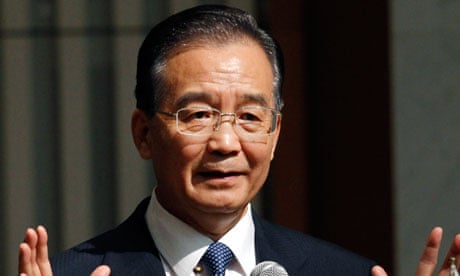China's premier has flagged up the need for political reform, in the latest of several outspoken remarks on an issue senior Communist party leaders usually avoid in public.
Wen Jiabao said: "The people's wishes for, and needs for, democracy and freedom are irresistible."
In an interview with CNN he also said the party "should act according to the constitution and law" and pledged: "In spite of some resistance, I will act in accordance with these ideals unswervingly and advance, within the realm of my capabilities, political restructuring."
Analysts see little prospect of significant reform and stress that his remarks should be treated with caution: "democracy" is often used by Chinese leaders and does not mean multi-party elections, for example.
"It's impossible to know exactly what Wen means by 'political reform' and 'universal values' … he probably envisions a great deal less reform and a great deal less human rights than we would think such words imply," cautioned Prof Andrew Nathan of Columbia University, following earlier remarks by the premier.
Prof Edward Friedman, an expert on Chinese politics at the University of Wisconsin-Madison, said that many Chinese people sympathetic to the sentiments Wen was espousing also seemed doubtful of whether he was engaged in a political struggle for them, "or just setting out a position so he has a certain historical legacy".
Even so, the premier's comments are in marked contrast to the sentiments usually heard from leaders. In August Wen used a speech marking the 30th anniversary of economic reforms to call for political changes. He said authorities should create the conditions for people to criticise and monitor the government and solve "the excessive concentration of unrestrained power". He has since returned to the theme repeatedly.
Earlier this year he had raised eyebrows by writing a highly personal tribute to Hu Yaobang, the reformist leader whose death sparked the student protests in Tiananmen Square in 1989.
"It is a good thing that someone who is at such a high position is talking about it, while many more are just being silent," said Chen Ziming, a Beijing-based intellectual and dissident. "But judging from the current situation, [political reform] is not likely to happen in the near future. Although the ordinary people want some change and there are different voices inside the party, the vested interests group is not going to give up what they have just like that."
"It is pie in the sky," added activist and scholar Chen Yongmiao. "He only has two years left in office; even if he really sincerely wants it to happen, he cannot make it. For political reform to take place we need a really powerful leader to face the bureaucracy that's constituted by so many people, to challenge it and to defeat it. Only Mao or Deng has had that kind of power."
Some had hoped that Wen's speech in Shenzhen in August might be setting the scene for a broader reassessment by the party. Instead, the Chinese president Hu Jintao's speech stuck to party orthodoxy.
While the premier's comments allowed liberal publications to run unusually bold calls for change, conservative media were swift to push back with thinly-disguised critiques of his speech.
Russell Leigh Moses, a Beijing-based political analyst, cautioned against seeing differences in opinion as a sign of a power struggle.
"Hu and Wen have been very close on issues of migrant workers, the countryside, redressing imbalances of income … for me, I think if there's a difference in opinions, it's not between camps [but] between policy and is healthy," he said.
He suggested that Wen might be trying to broaden the agenda and "let some air into the room" ahead of the party central committee's fifth plenum this month. It is expected to focus on economic issues but is also likely to see personnel changes in preparation for 2012, when Hu and Wen will step down and a new generation of leaders take over.
Dr Yawei Liu, director of the Carter Centre's China Programme, also warned against the "voyeurism" of Pekingologists trying to decipher inner party rivalries. "What is important is to drag the debate from the level of socialist versus capitalist to the ground of pragmatism: what will be the feasible measures that may curtail the abuse of power, reduce corruption and restore the legitimacy of the party?" he said.
Wen's interview with CNN, his first with a foreign journalist for two years, was taped on 23 September.
